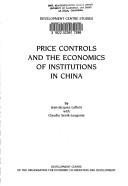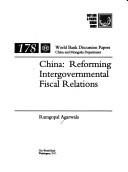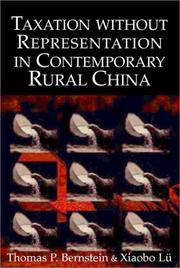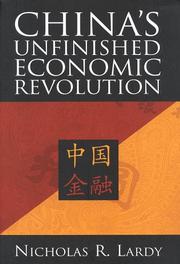| Listing 1 - 10 of 33 | << page >> |
Sort by
|
Book
ISBN: 3889100848 Year: 1990 Volume: 191 Publisher: Hamburg : Institut für Asienkunde,
Abstract | Keywords | Export | Availability | Bookmark
 Loading...
Loading...Choose an application
- Reference Manager
- EndNote
- RefWorks (Direct export to RefWorks)
Book
ISBN: 2711778886 Year: 2006 Publisher: Paris : Vuibert,
Abstract | Keywords | Export | Availability | Bookmark
 Loading...
Loading...Choose an application
- Reference Manager
- EndNote
- RefWorks (Direct export to RefWorks)
Book
ISBN: 9814332003 9814332011 9789814332002 9789814332019 Year: 2013 Publisher: Singapore Enrich
Abstract | Keywords | Export | Availability | Bookmark
 Loading...
Loading...Choose an application
- Reference Manager
- EndNote
- RefWorks (Direct export to RefWorks)
This book provides a comprehensive analysis of China's tax system, including the latest changes in the country's methods of taxation. The book details the current tax system with a focus on tax rates, taxpayers, tax incentives, and specific taxation. The book covers 9 tax types, including value added tax, consumption tax, business tax, customs duty, enterprise income tax, individual income tax, resource taxes, property taxes, and taxes for special purposes.
Book
ISBN: 1623200563 9781623200565 1623200008 1336200677 9781623200008 Year: 2015 Publisher: Honolulu Enrich Professional Publishing
Abstract | Keywords | Export | Availability | Bookmark
 Loading...
Loading...Choose an application
- Reference Manager
- EndNote
- RefWorks (Direct export to RefWorks)

ISBN: 9264154736 Year: 1997 Publisher: Paris
Abstract | Keywords | Export | Availability | Bookmark
 Loading...
Loading...Choose an application
- Reference Manager
- EndNote
- RefWorks (Direct export to RefWorks)
Money --- Price regulation --- Pricing --- S10/0420 --- Price policy --- Price policy, Industrial --- Retail pricing --- Marketing --- China: Economics, industry and commerce--Public finance and taxation: since 1949 --- China --- Economic conditions --- Economic policy --- Economic order --- Economic policy and planning (general)

ISBN: 0821322230 Year: 1992 Publisher: Washington, D.C. World Bank
Abstract | Keywords | Export | Availability | Bookmark
 Loading...
Loading...Choose an application
- Reference Manager
- EndNote
- RefWorks (Direct export to RefWorks)
Intergovernmental fiscal relations --- S10/0420 --- Federal-state fiscal relations --- Fiscal relations, Intergovernmental --- State-local fiscal relations --- Federal government --- Finance, Public --- Local finance --- China: Economics, industry and commerce--Public finance and taxation: since 1949 --- Law and legislation --- #A9302E --- Taxes --- China
Book
ISBN: 9781623201104 9781623201111 162320111X 1623201101 Year: 2017 Publisher: Honolulu, Hawaii
Abstract | Keywords | Export | Availability | Bookmark
 Loading...
Loading...Choose an application
- Reference Manager
- EndNote
- RefWorks (Direct export to RefWorks)
Finance --- Monetary policy --- Structural adjustment (Economic policy) --- S10/0320 --- S10/0420 --- China: Economics, industry and commerce--Money and banking: since 1949 --- China: Economics, industry and commerce--Public finance and taxation: since 1949 --- China --- Economic policy --- E-books

ISBN: 0521813182 0521082897 0511180055 0511064721 051105839X 051130689X 0511509979 1280419725 1139148052 0511073186 1107133211 9780521082891 9780511509971 9780521813181 9780511064722 9780511073182 Year: 2003 Publisher: Cambridge ; New York : Cambridge University Press,
Abstract | Keywords | Export | Availability | Bookmark
 Loading...
Loading...Choose an application
- Reference Manager
- EndNote
- RefWorks (Direct export to RefWorks)
The financial burden imposed upon the Chinese farmer by local taxes has become a major source of discontent in the Chinese countryside and a worrisome source of political and social instability for the Chinese government. Bernstein and Lü examine the forms and sources of heavy, informal taxation, and shed light on how peasants defend their interests by adopting strategies of collective resistance (both peaceful and violent). Bernstein and Lü also explain why the central government, while often siding with the peasants, has not been able to solve the burden problem by instituting a sound, reliable financial system in the countryside. While the regime has, to some extent, sought to empower farmers to defend their interests - by informing them about tax rules, expanding the legal system, and instituting village elections, for example, these attempts have not yet generated enough power from 'below' to counter powerful, local official agencies.
S10/0420 --- S20/0260 --- S20/0253 --- Tax incidence --- -Taxation --- -Duties --- Fee system (Taxation) --- Tax policy --- Tax reform --- Taxation, Incidence of --- Taxes --- Finance, Public --- Revenue --- Incidence of taxation --- Tax burden --- Tax equity --- Taxation --- Tax shifting --- China: Economics, industry and commerce--Public finance and taxation: since 1949 --- China: Agriculture forestry, fishery, natural disasters--Peasant economy --- China: Agriculture forestry, fishery, natural disasters--General works: since 1979 --- China --- Politics and government. --- Tax incidence. --- Taxation. --- Public Finance --- Political Science --- Law, Politics & Government --- Social Sciences --- -China: Economics, industry and commerce--Public finance and taxation: since 1949 --- Agriculture --- Farm produce --- Peasants --- Local taxation --- Local taxation. --- China.

ISBN: 0815751338 Year: 1998 Publisher: Washington (D.C.): Brookings institution
Abstract | Keywords | Export | Availability | Bookmark
 Loading...
Loading...Choose an application
- Reference Manager
- EndNote
- RefWorks (Direct export to RefWorks)
S10/0251 --- S10/0420 --- S10/0320 --- S10/0526 --- China: Economics, industry and commerce--General works and economic history: since 1989 --- China: Economics, industry and commerce--Public finance and taxation: since 1949 --- China: Economics, industry and commerce--Money and banking: since 1949 --- China: Economics, industry and commerce--State enterprises --- Banks and banking --- Finance --- China. --- China --- Economic conditions --- Economic policy
Book
ISBN: 1785609572 9781785609572 1785609580 9781785609589 Year: 2016 Publisher: United Kingdom : Emerald,
Abstract | Keywords | Export | Availability | Bookmark
 Loading...
Loading...Choose an application
- Reference Manager
- EndNote
- RefWorks (Direct export to RefWorks)
Volume 17 of International Finance Review focuses on a variety of issues relating to the political economy of Chinese finance, including: the pattern of government ownership and control of Chinese firms; the role of government in corporate governance of industrial and financial firms; the interaction of culture, law and institutions in Chinese governance systems; corporate social responsibility, stakeholders and sustainable growth; the effect of political connections on corporate performance and society; privatization, IPOs, exchange listing and firm valuation; the role of government in banking and financial markets; practice of corporate risk management and insurance; foreign-exchange policy and its effect on firms and markets; foreign direct and portfolio investments in China; international investments and operations of Chinese firms; Chinese economic relations with the US and other countries.
Finance --- China --- Economic conditions. --- Politics and government. --- E-books --- S10/0320 --- S10/0420 --- S10/0581 --- China: Economics, industry and commerce--Money and banking: since 1949 --- China: Economics, industry and commerce--Public finance and taxation: since 1949 --- China: Economics, industry and commerce--Management of state enterprises --- Business & Economics --- Finance.
| Listing 1 - 10 of 33 | << page >> |
Sort by
|

 Search
Search Feedback
Feedback About UniCat
About UniCat  Help
Help News
News